Baha'i Citizen’s 10 Year Prison Sentence Upheld By Iranian Appeal Court

An Iranian Baha'i citizen has had a prison sentence of more than ten years upheld by an appellate court for possessing religious books and materials.

An Iranian Baha'i citizen has had a prison sentence of more than ten years upheld by an appellate court for possessing religious books and materials.
Officials have cited Sanaz Tafazzoli, was also "organizing educational groups for Baha'i children" among the charges brought against her, the latest case one in a long line facing persecuted Baha'i in Iran.
The charges brought against her include "forming a group with the intent to disrupt internal security," resulting in a sentence of six years and six months. Additionally, she received a three-year and seven-month prison term for "collusion and conspiracy to commit a crime against national security," and eight months for engaging in "deviant educational or promotional activities."
The 1979 constitution of the Islamic Republic only officially acknowledges Islam, Christianity, Judaism, and Zoroastrianism as recognized religions. Supreme Leader Ali Khamenei, in a religious verdict issued in 2018, prohibited any form of contact, including business interactions, with adherents of the Baha'i faith.
Tafazzoli was arrested at home last November in Mashhad by agents of the Ministry of Intelligence, and imprisoned in Vakilabad Prison.
The Baha'i population, estimated to be approximately 300,000 in Iran and the largest minority, are routinely arrested and detained. They frequently experience harassment, are coerced into leaving their residences and businesses, and face discrimination in terms of access to government employment and higher education opportunities.
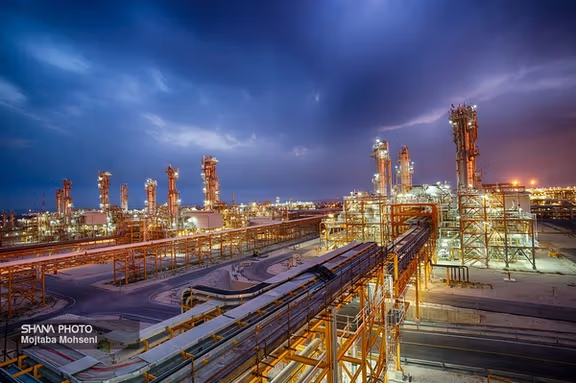
Iranian academics' assessment of Iran's critical economic situation, which hinders its development, appears to be backed by credible international statistics.
Mahmoud Sariolghalam, an Iranian academic, emphasized the importance of a country having sufficient income for cultural and social growth. He also pointed out that a country without sufficient income lacks international credibility and faces constant challenges to its stability and security.
These statements are reinforced by alarming statistics that highlight Iran's significantly lower gross domestic product (GDP) compared to other Middle East and North Africa countries. In 2022, Iran's GDP was $350 billion, while Saudi Arabia's was $1,100 billion, Israel's was $522 billion, the UAE's was $507 billion, and Egypt's was $475 billion, according to Statista.
Last week, when visiting Esfahan, President Ebrahim Raisi said with a tongue-in-cheek gesture: "If we do not invest in industrial development, we will lag behind others. If we do not invest in the oil and petrochemical industries, our share of the shared oilfields with other countries will become insignificant."
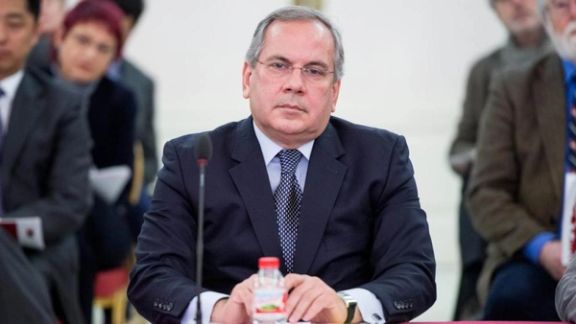
However, Iranian journalist Ehsan Bodaghi reminded Raisi in a tweet that "Even a student of economics knows this simple fact. He should say how effective investment is possible without lifting the sanctions?"
Sanctions that the United States imposed in 2018 after withdrawing from the JCPOA nuclear accord have immeasurably weakened Iran’s economy, which was already suffering from government control, corruption and mismanagement.
Knowing that most of Iran's problems stem from its shaky relations with Europe and the United States, Azizollah Hatamzadeh, the author of the book Iran's Trans-Atlantic Relations published by the Iranian government's Strategic Research Center, told Khabar Online in Tehran that some of Iran's problems stem from the United States' attempts to create a security situation around the Islamic Republic.
Like most scholars and analysts in Iran, Hatamzadeh also failed to mention Iran's share in creating problems for itself. While accusing the United States and Europe of conspiring against Tehran, he -possibly deliberately- forgets what Iran has been doing to US interests in the region and how it has disrupted its normal ties with Europe by taking European citizens hostage, threatening Iranians in Europe and engineering assassination attempts in Europe against Iranians and non-Iranians.
Hatamzadeh discussed the post-Cold War developments in Iran's relations with the West and noted Donald Trump's influence in changing those relations. He also mentioned that Trump challenged traditional US-Europe ties and predicted that disputes between the US and Europe might resurface if Trump won the next US presidential elections.
The author generally believes that the United States has always managed to convince Europe to follow Washington's policies toward Iran.
This feeds into part of the Iranian establishment's belief in the fallacy that differences between the US and Europe will prompt Europe to invest in Iran. That is impossible as long as US and other sanctions are still in effect. On the other hand, Iranian scholars keep forgetting that it was Europe that recently decided to extend the embargo on Iran's missile development plan beyond its mid-October deadline.
Meanwhile, Moscow's war on Ukraine has made the West even more united and this unity will continue as long as the war continues. Hatamzadeh, however, acknowledged that as a result of the Ukraine war, Europe recognizes Iran as a security challenge regardless of its proximity to or its distance from the United States.
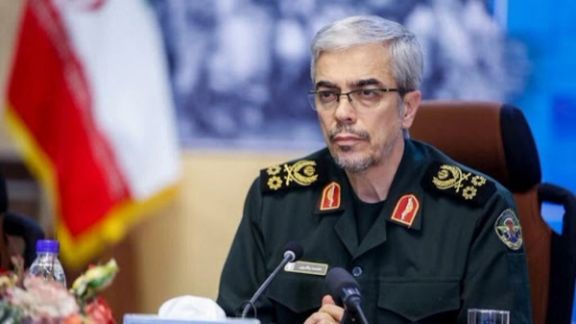
As the international community continues to denounce the recent Hamas invasion of Israel, Iranian officials are openly encouraging Palestinians to escalate their efforts.
Mohammad Baqeri, the chairman of the chiefs of staff of the Iranian armed forces claimed it would not be long before Palestinian youth succeeded in liberating the Al-Aqsa Mosque from what he referred to as "the Zionist enemy."
He slammed the ongoing normalization attempts between Israel and Arab nations as a "plot" to prevent the collapse of the Jewish state, saying it “could neither halt nor delay the inevitable decline of Israel".
Iranian authorities have consistently criticized Saudi Arabia's efforts to establish relations with Israel, viewing such initiatives as detrimental to Palestinians.
Baqeri, in his message, also praised the efforts of Palestinian groups in their operations against “the Zionist armed forces in the occupied territories.”
Tehran has long provided support to militant Palestinian groups, including Hamas and the Islamic Jihad, both of which carried out the recent attacks against Israel and its civilians, resulting in the deaths and injuries of hundreds. The groups are part of Iran's extensive network of proxy forces that span the region from Iraq to Lebanon and Yemen. Tehran openly acknowledges providing financial and military assistance to the proxies.
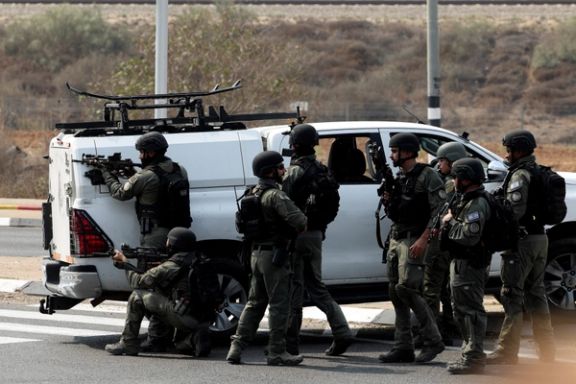
US President Joe Biden has sent a clear message to Tehran to back down as its Palestinian proxy, Hamas, rains down terror on Israel.
In a rare statement supporting the retaliatory action, Biden said Israel had the US’s unequivocal support. He said: “Let me say this as clearly as I can: This is not a moment for any party hostile to Israel to exploit these attacks to seek advantage,” in a veiled message to the regime.
Meanwhile talks are underway for the US to provide military support. Biden’s statements come as Tehran has been emboldened by a hostage deal which saw five US-Iranian citizens freed in exchange for the release of $6bn of frozen Iranian funds from South Korea. In addition, the US Biden administration agreed in June to release another $2.7 blocked in Iran.
Since Saturday morning, Hamas has sent thousands of rockets across the border into Israel with hundreds dead, hundreds more wounded and dozens of Israeli civilians and soldiers taken hostage, dead and alive into Gaza, including women, elderly and children.
The US made clear its support for Israel with US Defense Secretary Lloyd Austin making a public statement seen as a warning to the regime that the US will not stand by as Iran continues to arm its proxies.
“Over the coming days the Department of Defense will work to ensure that Israel has what it needs to defend itself and protect civilians from indiscriminate violence and terrorism,” he said.
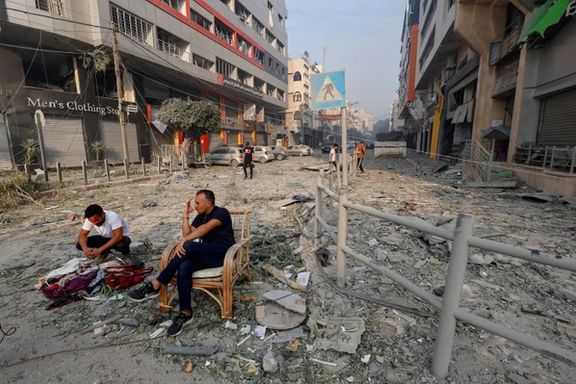
One of the Hamas spokespeople, Ghazi Hamad, told the BBC that the group had direct backing for the attack from Iran. Attacks were also seen across Israel’s northern border from Iran’s Lebanese proxy, Hezbollah.
Tehran has been bolstering unity between its proxies on Israel’s borders, in recent months. Just last week, another Hamas commander, Osama Hamdan, had been in Tehran while the leaders of Hamas, Palestinian Islamic Jihad (PIJ) and Popular Front for the Liberation of Palestine met with foreign minister Hossein Amir-Abdollahian in what was said to be a meeting to consolidate the various factions.
At last week’s International Conference Of Islamic Unity held in Iran, several of its proxies used the arena as a stage to call on unity against the region’s growing warm ties with Israel.
In 2020, the US-brokered Abraham Accords saw countries including Bahrain and the United Arab Emirates form official diplomatic ties and in recent weeks, relations with Saudi Arabia and Israel are growing ever closer, according the the Saudi Crown Prince, Mohammed bin Salman.
Hamdan went as far as to say that normalization is the biggest threat to the Palestinian people, calling for all to “stand and resist”, reiterating the group’s “condemnation” of nations normalizing ties with the Jewish state.
Meetings involving the Palestinian factions and the factions of Israel’s neighbors also took place last week, in Damascus and Beirut, alongside Hamas and the PIJ, mediated by the foreign minister on a regional tour believed to be cementing Iran’s policy across its proxies across Israel’s borders.
Former Iran envoy, Gabriel Noronha, called out a US official who claimed it was “too early” to say if Iran was behind the attacks on Israel, in spite of Hamas admissions that it was regime-backed.
Noronha wrote on X: “This not only contradicts Hamas' spokesperson's on-record confirmation, it ignores three decades of evidence,” including Yasser Arafat claiming in 1992 that Iran had provided $30 million to Hamas and in 1995, Clinton's CIA Director James Woolsey told Congress Iran had provided Hamas with $100 million.
Other criticism has been raining on the Biden administration. “None of what is happening in the Middle East today had to happen. The US since 2021 has allowed the Iranian regime to run riot and the Iranians have deliberately set the region on fire,” said Joel Rayburn, founder and director of the American Center for Levant Studies.
“This is the absolutely predictable consequence of wilful American negligence and weakness,” he said on X.
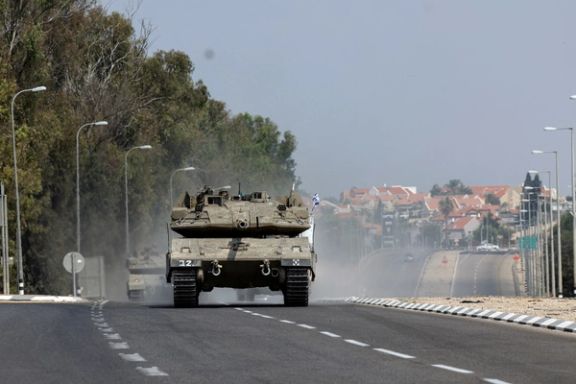
Overnight, Israel began its retaliatory attacks on targets in Gaza including infrastructure, tunnels and buildings belonging to Hamas. Hundreds of deaths were mounting on both sides.
According to Israeli media, more than 350 Israelis are feared dead, 1864 wounded and dozens more hostage in Gaza. So far the IDF has named 26 soldiers killed with the list being updated all day as families are informed.
According to the Palestine Ministry of Health, 313 have been killed following Israeli airstrikes and 2,000 wounded in Gaza.
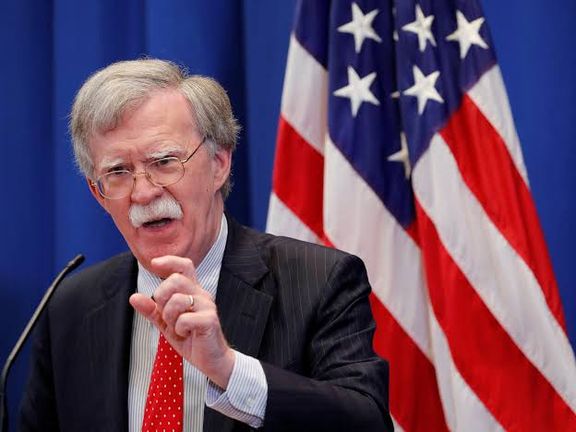
The recent Hamas terror attack on Israel has ignited a wave of criticism directed at the Biden Administration.
Some prominent US political figures expressed concerns over the administration's Iran deal and the release of funds that Iran is allegedly funneling to its proxies.
Former National Security Advisor of the United States, John Bolton, raised a pivotal question regarding the brutal Hamas attack on Israel asking whether Hamas acted independently or under orders from the Iranian government, which provides financial support, arms, and training to Hamas fighters. Bolton stated, "The evidence is becoming clearer hour by hour that the real aggressor here is Iran."
Morgan Ortagus, former Spokesperson for the United States Department of State, also condemned Iranian-backed terrorists for their reprehensible actions during the attack. She referred to disturbing videos circulating on social media that depicted Hamas militants brutally dragging the lifeless bodies of Israeli women through the streets after assaulting and killing them. Ortagus asserted, "Biden has got to stop sending billions of dollars to Iran. Just stop it."
Former CIA officer Norman Roule echoed similar sentiments, emphasizing the grave consequences of sanctions relief for Iran. He pointed out that while Iran has supported Hamas with hundreds of millions of dollars even under stringent sanctions, the recent relaxation of sanctions has significantly escalated Iran's support, resulting in deadly consequences for civilians.
Roule stated, "The next time someone argues that sanctions have no impact or presses for sanctions relief, remind them of this moment. Decisions have consequences."
The attack has resulted in a significant loss of life in Israel, with at least 250 people killed and 1,500 wounded, making it the deadliest assault on Israel in decades, people taken hostage in their homes, killed in the streets and in their cars, and whole villages under siege by Hamas militants who infiltrated by land, sea and air.
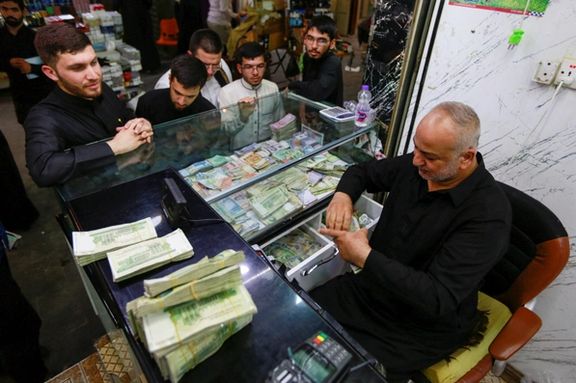
The Iranian currency has fallen noticeably in the past two days as the Palestinian Hamas unleashed a devastating attack on Israel early on Saturday.
The rial began to slightly fall late on Friday, before the attack, while the fall accelerated on Saturday. While for weeks the rial was hovering around 495,000 per US dollar, it broke through the 500,000 on Saturday and dropped to 515,000 on Sunday.
Iran is widely seen as supporting the militant Palestinian groups and specifically the attack launched on Saturday morning. Top Iranian officials and government media did not hide their glee at the initial success of the Hamas attack and expressed their outright support.
Israel has vowed punishing revenge against Hamas, but the prospect of escalation beyond the Palestinian territories, and possible military conflict with Iran is apparently increasing the demand for the US dollar and other major currencies in Tehran.
The rial has lost its value 12-fold since early 2018, when the United States withdrew from the JCPOA nuclear deal and imposed tough economic sanctions on Iran. This has made imports much more expensive and has led to very high inflation at around 50 percent for the past three years.
Some officials and media in Tehran have been warning that tens of millions of people have fallen into poverty because of persistent high inflation, and this in turn has seriously contributed to political instability. Widespread anti-regime protests in 2022 and 2023 are partly attributed to financial hardships ordinary citizens face.